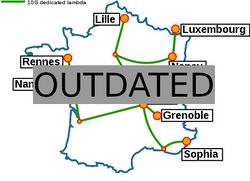Grid5000:Home
|
Grid'5000 is a large-scale and versatile testbed for experiment-driven research in all areas of computer science, with a focus on parallel and distributed computing including Cloud, HPC and Big Data. Key features:
Older documents:
|
Random pick of publications
Five random publications that benefited from Grid'5000 (at least 2932 overall):
- Dorian Goepp, Samuel Brun, Quentin Guilloteau, Olivier Richard. Un prototype de cache de métadonnées pour le passage à l'échelle de NixOS-Compose. COMPAS 2024 - Conférence francophone d'informatique en Parallélisme, Architecture et Système, Jul 2024, Nantes, France. pp.1-8. hal-04632952 view on HAL pdf
- Bruno Lévy, Nicolas Ray, Quentin Merigot, Hugo Leclerc. Large-scale semi-discrete optimal transport with distributed Voronoi diagrams. Journal of Computational Physics, 2025, pp.114374. 10.1016/j.jcp.2025.114374. hal-05253830 view on HAL pdf
- Cassandre Vey, Adrien van den Bossche, Réjane Dalcé, Georges da Costa, Olivier Negro, et al.. Experimenting IoT-Edge-Cloud- HPC Continuum on Existing Platforms. 2025 IEEE 25th International Symposium on Cluster, Cloud and Internet Computing Workshops (CCGridW), IEEE, May 2025, Tromsø Norway, Norway. 10.1109/CCGridW65158.2025.00026. hal-05147272 view on HAL pdf
- Rémi Meunier, Thomas Carle, Thierry Monteil. Multi-core interference over-estimation reduction by static scheduling of multi-phase tasks. Real-Time Systems, 2024, pp.1--39. 10.1007/s11241-024-09427-3. hal-04689317 view on HAL pdf
- Matthieu Simonin, Anne-Cécile Orgerie. Méthodologies de calculs de l'empreinte carbone sur une plateforme de calcul - L'exemple du site de Rennes de Grid'5000. JRES 2024 – Journée Réseaux de l'Enseignement Supérieur, Dec 2024, Rennes, France. pp.1-13. hal-04762718v2 view on HAL pdf
Latest news
Failed to load RSS feed from https://www.grid5000.fr/mediawiki/index.php?title=News&action=feed&feed=atom: Error parsing XML for RSS
Grid'5000 sites
Current funding
As from June 2008, Inria is the main contributor to Grid'5000 funding.
INRIA |
CNRS |
UniversitiesUniversité Grenoble Alpes, Grenoble INP |
Regional councilsAquitaine |


